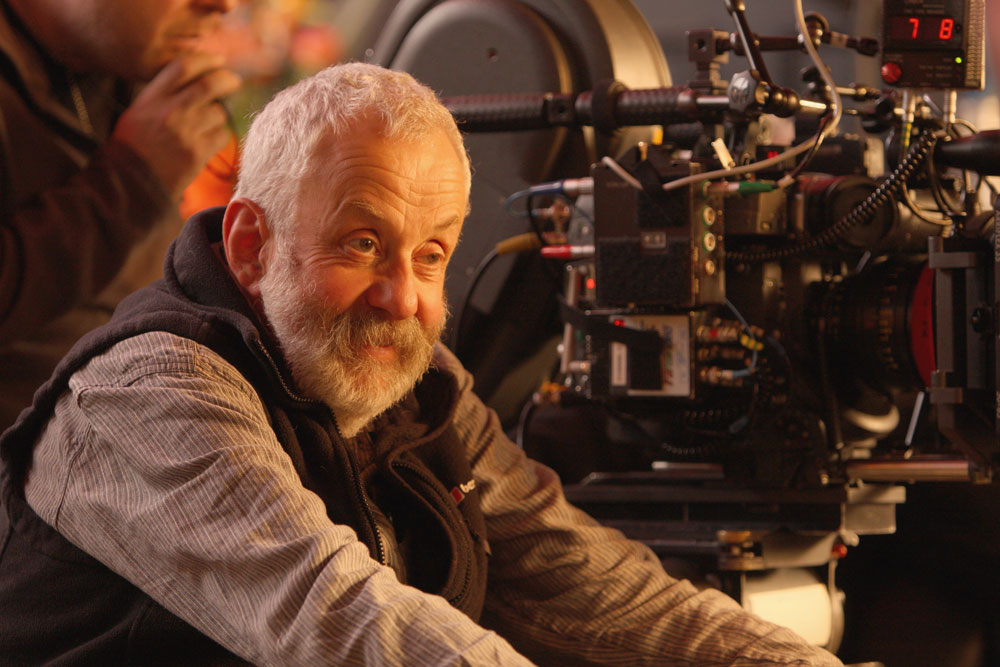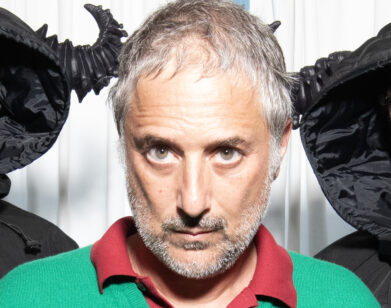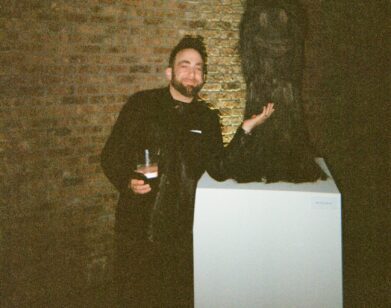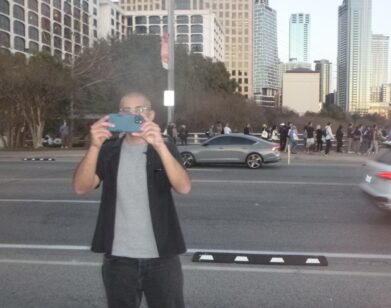The Auteur, The Voyeur: Mike Leigh Talks

MIKE LEIGH ON SET. PHOTO COURTESY OF SONY PICTURES CLASSICS
Unfolding over four seasons, Mike Leigh (Secrets and Lies, Vera Drake)’s latest, Another Year, is a character film so richly anchored by its intuitive everyday lilt that even the slightest remark between two friends at a summer barbecue—”Life’s not always kind”—can reveal a deep avowal of life’s main concerns: loneliness and love, regret and forgiveness, refusal and resignation.
Gerri (Ruth Sheen) and Tom (Jim Broadbent) are a happily married pair who have approached their later years in the same way they tend to their garden allotment—merrily and tenderly, with quiet tea breaks and the occasional jokey scoff about growing old. Their family—brother, Ronnie (David Bradley) and son, Joe (Oliver Maltman)—and friends, Ken (Peter Wight) and Mary (Lesley Manville), rely on them for invariable warmth, conversation, and nostalgia.
But what happens when these relationships grow less and less reciprocal? As is the standard with some of Leigh’s greatest films, an immersive understanding of each character’s self-doubt and history can pivot one moment’s chatty monotone into something far more bleak and upsetting. We spoke with Leigh about Another Year and the conversational chemistry that inhabits his films.
DURGA CHEW-BOSE: Hi, Mike.
MIKE LEIGH: Hello.
CHEW-BOSE: So, Another Year. I attended a screening a couple of days ago and I didn’t except to laugh as much as I did. The comedy was subtle but spot on. How long did you rehearse with the actor and crew in order to capture such intimate and natural moments?
LEIGH: Well, it varies, obviously, but we do spend months and months creating these characters, creating the world, their history, exploring their relationships. I mean you see for me the-which is not really what you’re asking, but it helps to explain-the journey of making the film is a journey of discovering what the film is. So by the time we get to the shoot, there’s very much a solid preparation, because a lot of the neurosis and hysteria and shit that goes on both sides of the camera arises from insecurity and people not knowing what they’re doing, and being insecure and therefore falling back on bad behavior, and all the rest of it. On the whole, that doesn’t happen on these films, because there’s a solid foundation. What we do is very dangerous, because we make it up as we go along. The other thing is, the crew on a film normally has read the script and so they know all about what’s going to happen and it’s about manufacturing it. But on my films nobody ever knows what’s going to happen next. Also, we build and we build, and we’ve got people that have come back time after time to work on these films. Crew and actors both. Lesley Manville, for instance, this is her ninth time.
CHEW-BOSE: Yeah, even Gerri and Tom’s home felt lived-in by them. In small ways, like how they walked up and down the stairs or leaned against the kitchen counters…
LEIGH: Yes, well, because we do all that work. First of all, all the designers worked with us and the actors had some input too, through their characters, of course. And we do all kinds of work that has to do with getting used to the space. This doesn’t always happen in most films. I mean in the end, to me, it’s just common sense. You know a film’s supposed to be like it’s really happening.
CHEW-BOSE: It certainly felt real. There were times when I felt as though I was witnessing private moments that weren’t mine to witness. It was often very voyeuristic and uncomfortable in a great way.
LEIGH: But films should be voyeuristic. What else is a film if you’re not snooping into somebody else’s lives? And of course you’re saying it in a useful way, but I have had people object to my films saying they’re too voyeuristic. All films are voyeuristic.
CHEW-BOSE: The opening scene introduces Janet (Imelda Staunton), a character who does not return. Is her visit to the doctor’s, and then later Gerri for some counselling, an overture for the entire film?
LEIGH: Yes, a prologue. Yes, that is absolutely right. Without that scene, the first thing you the audience would see is Tom and Gerri going to their allotment, it’s all comfortable and everything is nice and cozy. What I do is before you have time to blink, I plunge you headlong into this core this center, this furnace of pain and suffering and this poor woman’s desire for a decent night’s sleep. This poor woman has no warmth or humour or perception of her situation. She’s just completely negative…
CHEW-BOSE: And she repeats “Nothing changes…” a few times…
LEIGH: Right. So see, it conditions you and prepares you for what then follows. She’s kind of a warm-up act for Mary. The next thing is that it introduces Gerri early on, and what Gerri does. Because you need to see her functioning professionally; it’s an important aspect of who she is. The other thing is that the reason Janet’s character is only in that one bit is because there’s no way she’s coming back. When she walks out of that door we know that’s the last we’ll ever see her.
CHEW-BOSE: Would you ever make a movie in the US, with American actors?
LEIGH: Well I’m disappointed that the quality of your questions has suddenly sunk so low, so quickly, when they were originally so…I’m only joking! I’m only joking! I’m not serious. No, I mean look, the thing is that yes, it would be possible, not with you know the kind of Hollywood stars that couldn’t possibly be…Well one of the things about my films is that the actors don’t know what the film is. You couldn’t get a Hollywood actor to do that. But there are very good actors here who could do that. However, quite separately is the fact that I am committed to British cinema. I feel very much ideologically, politically if you like, and emotionally part of the European cinema. I think it’s important that nobody forgets that although Hollywood commercially dominates the world cinema, in fact what comes out of the filmmaking here is only a tiny slice out of the massive amount of operation that goes on around the world. I care about and take some responsibility for nurturing and sustaining films made in Europe, specifically in that funny group of islands off the French coast.






